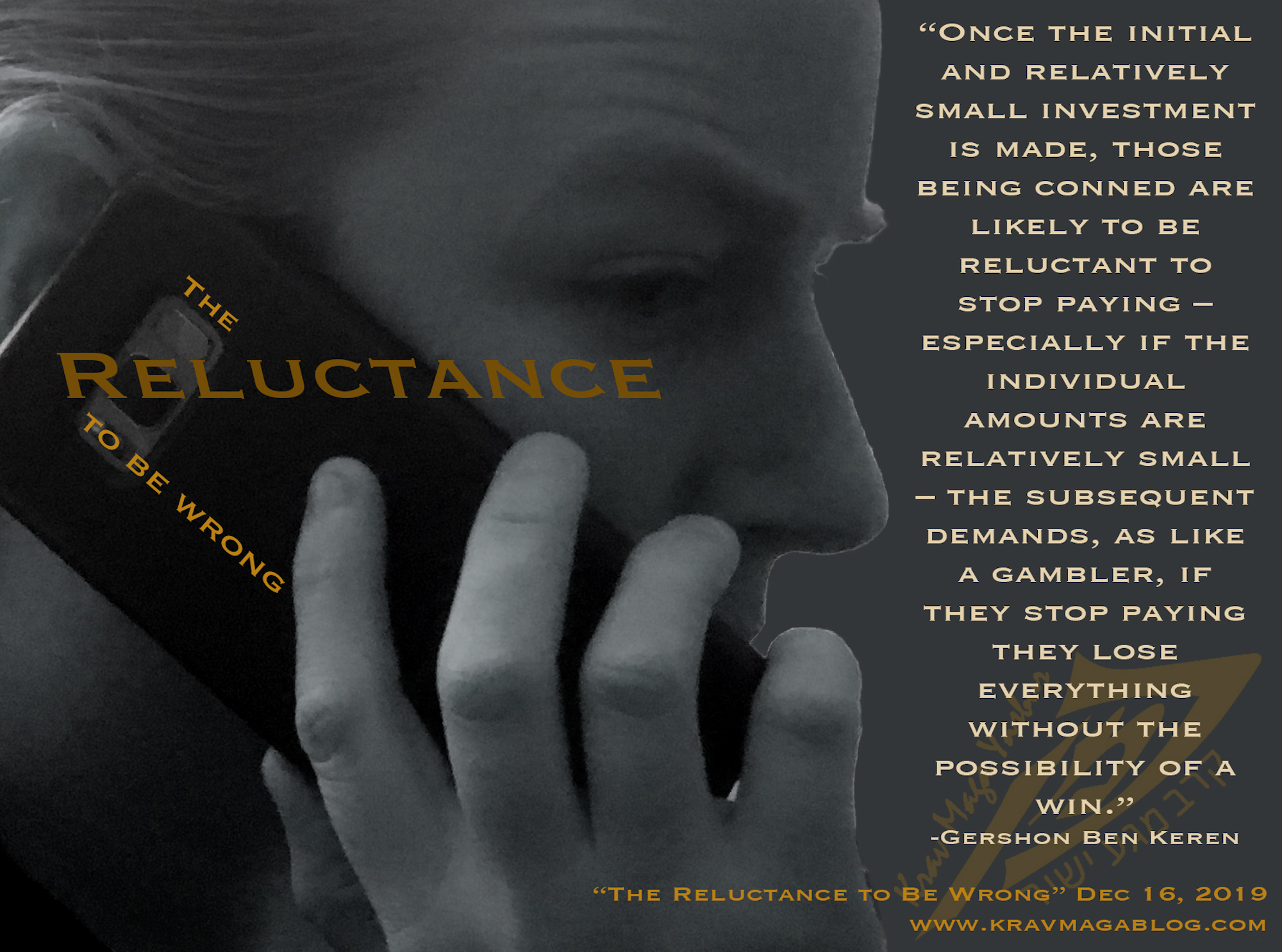Author: Gershon Ben Keren

It can be hard to admit we are wrong, especially if we have invested in something or someone for a period of time, and desperately want to believe that we’re not – even if all the evidence points to the contrary. The human mind is all too capable of performing logical gymnastics in order to rewrite a situation or incident so that we can prove ourselves right, which cannot only affect our judgment concerning present decision-making, but also affect our ability to make good decisions in the future; which is why we rarely learn from our “mistakes” i.e. our decision-making processes have been re-written to include errors as opposed to detecting and identifying them. This is one of the reasons why people continue to make bad mistakes, one after another. In this article, I want to look at how the desire to be “right”, can affect our personal safety in the moment, and in the future.
One of the questions that many people ask of individuals – whether male or female - who are in emotionally and physically abusive relationships is why they don’t “just leave”. We like to think that if somebody was treating us this way, and physically harming us, we would do the “sensible” and “obvious” thing and just leave. The issue is though that many individuals who are in these relationships don’t view them as dysfunctional or abusive. Nobody wants to see themselves as a victim of abuse, nobody wants to admit to themselves that they made the “wrong” choice in selecting their partner, or that they no longer have control over their life, etc. This is something that is extremely hard for individuals to both recognize and accept. Using a mixture of discounting (e.g. things aren’t really that bad) and denial (e.g. all relationships are like this and have their ups and downs, etc.) it’s possible for us to convince ourselves that an abusive relationship, whether psychologically, emotionally, sexually or otherwise is in fact “normal” – and the longer we do this, the harder it will be for us to recognize that this is far from the case. If we have invested in a bad decision, it is much more likely that we will keep investing in it, instead of recognizing it for what it is. One of the first, and most difficult steps, of leaving an abusive relationship is identifying and accepting that we are in one; and it is unlikely that being simply presented with the “facts” will accomplish this.
Predatory individuals understand this; that once invested in something, it is likely that we will keep investing even when we have serious concerns and doubts about what we are doing. This is how many scams and cons work, and whilst we may congratulate ourselves that we would never be so gullible as to fall for such things, we are all hard-wired with the ability to do so. One internet scam that I’ve known people to fall for is akin to a virtual kidnapping. An example of a virtual kidnapping would be where an offender steals your phone whilst you are on holiday in a foreign country, and then contacts your family members – who are now going to find it difficult to get in touch with you – to say that you’ve been kidnapped and that a ransom needs to be paid in order for you to be released quickly, etc. They will stress that the authorities shouldn’t be contacted, and that the payment needs to happen in the next few hours, etc. The extortionist’s concern is that if too much time passes you will end up contacting your family members, or them you, and the scam will quickly be revealed and fall apart. The amount asked for is usually significant, but small enough, that it can be quickly paid. A variation on this that can be played as a longer scam/game, is for those involved to pretend to be an attorney and contact a relative telling them that you are in prison for a road traffic accident and that they need to pay a fine, and then a bit later bail, and then a bit later some legal fees, etc., until eventually you get in contact with your family and the scam falls apart. Once the initial and relatively small investment is made, those being conned are likely to be reluctant to stop paying – especially if the individual amounts are relatively small – the subsequent demands, as like a gambler, if they stop paying they lose everything without the possibility of a win.
As individuals, we want to be right and we want our decisions to be validated – even if those decisions are being validated by the wrong person e.g. the individual conning or abusing us, etc. This is why we may be more likely to listen to and believe what they’re saying, rather than a friend or family member who is telling us that we are wrong. If there are competing arguments being made, it is likely that we will accept the ones that reinforce the idea that we are right; and the more we become invested in this position the less likely we are to accept further, contrary arguments, etc. This process will eventually start to frame our future decision-making, as we adopt it, and start to use it extensively and exclusively so making further and further bad decisions. Recognizing and admitting that we are wrong at the earliest opportunity, is the best and most effective way to counter this.